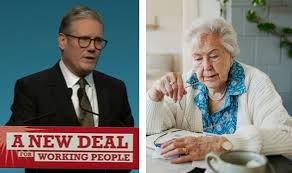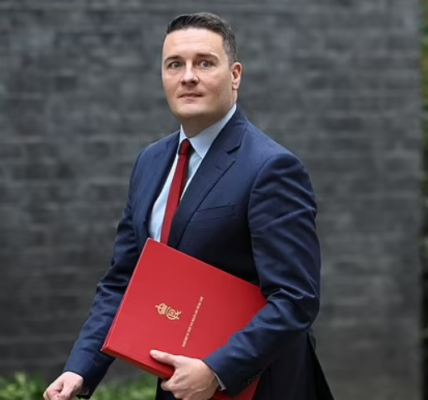Labour’s prison release scheme could see criminals let out early for YEARS to come amid five-year jail-building delay_Nhy
Labour’s early release scheme for criminals looks set to continue for years after it emerged the prison-building programme is five years behind schedule.
The taxpayer will also be hit with an additional bill of at least £4.2billion to pay for an extra 21,000 prison places planned by the Ministry of Justice.
The delay means jails are now expected to have a shortage of at least 12,400 places – and possibly as high as 21,200 – within three years, a report by the National Audit Office (NAO) will say today. It means more criminals are likely to avoid jail or be released early to prevent dangerous overcrowding. Estimated costs for the building scheme were originally put at £5.2billion in 2021, but are now expected to hit between £9.4billion and £10.1billion.
Auditors found the HM Prisons and Probation Service (HMPPS) made errors estimating the cost of setting up ‘rapid deployment cells’ – used to provide extra bed space in prison yards – which has gone 259 per cent over budget. Four new prisons are also expected to go up to 60 per cent over budget due to delays and inflation.
The report said: ‘HMPPS’s expansion plan was unrealistic and was not prioritised by the government.’
The severity of the cell shortage has forced the MoJ to explore the ‘least worst’ options to quickly expand capacity, the report said.

Daniel Dowling-Brooks celebrates after being released outside HM Prison Swaleside on the Isle of Sheppey. Labour’s early release scheme for criminals looks set to continue for years after it emerged the prison-building programme is five years behind schedule

Justice Secretary Shabana Mahmood’s scheme allows most offenders to be freed after serving 40 per cent of their sentence, rather than 50 per cent

The taxpayer will also be hit with an additional bill of at least £4.2billion to pay for an extra 21,000 prison places planned by the Ministry of Justice
It added previous governments failed to ensure prison space was keeping up with policies such as longer sentences. The number of inmates stood at 86,059 on Monday, down from a record high of 89,000 in September, after Labour freed thousands of criminals.
Justice Secretary Shabana Mahmood’s scheme allows most offenders to be freed after serving 40 per cent of their sentence, rather than 50 per cent.
It led to scenes of criminals celebrating their release, with one proclaiming ‘Big up Keir Starmer’ next to a £150,000 Bentley. The scheme was due to be reviewed after 18 months but the crisis exposed by the report makes it less likely it will be halted.
Prisons minister Lord Timpson said: ‘We have taken immediate action to address the crowding chaos engulfing our jails, and will now focus on improving conditions in the long term.’
SEE MORE:
Celebrity chef who endorsed Labour at the General Election warns Rachel Reeves’s Budget will have a ‘catastrophic effect’ on his industry
A celebrity chef who endorsed Labour at the General Election has now warned the Budget will have a ‘catastrophic effect’ on his industry.
Tom Kerridge was one of 120 business figures who signed an open letter in May, saying it was time to ‘give Labour a chance’.
But yesterday he said that the rise in employers’ National Insurance payments imposed by Chancellor Rachel Reeves would lead to a ‘huge amount of closures’ in the hospitality sector.
Shadow Home Secretary Chris Philp seized on his comments, saying: ‘Labour tricked businesspeople like Tom into supporting them at the election by pretending they had no plans to significantly raise taxes.’

Tom Kerridge, pictured, was one of 120 business figures who signed an open letter in May, saying it was time to ‘give Labour a chance’

Mr Kerridge said the in employers’ National Insurance payments imposed by Chancellor Rachel Reeves, pictured, would lead to a ‘huge amount of closures’ in the hospitality sector
Mr Kerridge said that he faces additional costs of about £850 a year for each of his 200 staff – about £170,000.
The intervention came as Natwest chief executive Paul Thwaite and Barclays’ CS Venkatakrishnan – who previously defended the Budget – admitted that small firms are struggling to cope with the National Insurance increase, while Andrew Wishart, a top economist at Berenberg Bank, has warned that it could cost 150,000 jobs.


